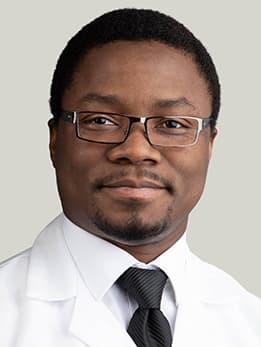Black patients are diagnosed with, hospitalized for and die of pulmonary fibrosis at younger ages than white patients

Pulmonary fibrosis is a devastating disease characterized by progressive scarring in the lungs, killing up to half of patients within five years of a diagnosis. Little is known about whether there are differences in how the condition affects individuals of different ethnicities. New research at the University of Chicago Medicine has found that Black patients with pulmonary fibrosis are significantly younger than their Hispanic and white counterparts across a wide variety of disease metrics, including diagnosis, first hospitalization, lung transplant and death.
“Pulmonary fibrosis is a deadly disease, and people are often diagnosed right around the time they retire,” said Ayodeji Adegunsoye, MD, MS, Assistant Professor of Medicine at UChicago Medicine and lead author on the study, published March 10 in Dr. Ayodeji Adegunsoye specializes in pulmonary medicine and critical care medicine.
Ayodeji Adegunsoye, MD
